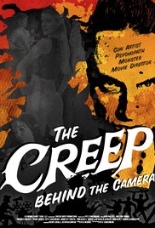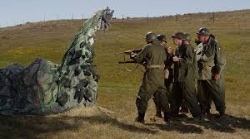
 Matching in ambition, Pete Schuermann’s The Creep Behind the Camera would make a good double feature with Tim Burton’s Ed Wood. I only wish it shared the latter’s focus and greatness.
Matching in ambition, Pete Schuermann’s The Creep Behind the Camera would make a good double feature with Tim Burton’s Ed Wood. I only wish it shared the latter’s focus and greatness.
A mix of documentary footage and fictionalized re-enactments, The Creep Behind the Camera chronicles in part the production of The Creeping Terror, generally and rightly considered to be one of the worst films ever made. The 1964 cheapie is, as one of this film’s interviewees puts it, “a very low-budget movie made by a very psychotic person.” The madman in question is Terror’s director, producer and star, Art “A.J.” Nelson, better known as Vic Savage. By all accounts a big ball of sleaze, Savage is portrayed with a predatory, slime-dripping smile by Josh Phillips (Text), in a durable performance that seems to channel early-career Bill Paxton.
 A former juvenile delinquent who never quite grew up, the bisexual Savage (who died in 1975) hustles and schemes and cheats his way through life and into grandiose dreams of Hollywood fame. That he has no discernible talent outside of fleecing others and abusing his long-suffering wife (Jodi Lynn Thomas, TV’s Preacher) hardly deters him.
A former juvenile delinquent who never quite grew up, the bisexual Savage (who died in 1975) hustles and schemes and cheats his way through life and into grandiose dreams of Hollywood fame. That he has no discernible talent outside of fleecing others and abusing his long-suffering wife (Jodi Lynn Thomas, TV’s Preacher) hardly deters him.
Overall, this tale of monsters, mobsters and Manson (yes, as in Charles) is at its best and brightest when either recreating or commenting upon the tortured shoot for The Creeping Terror, with its shambling creature of carpet scraps looking to extras not unlike giant labia. Savage’s disasterpiece was a natural for its eventual experimentation on Mystery Science Theater 3000, given that the black-and-white pic relied more on narration than dialogue, not to mention solicited a music score from a high school band; not for nothing does critic and Golden Turkey author Michael Medved say to Schuermann’s camera, “You will never see incompetence more sincere.” Other greatest bits depict Savage’s crazier off-set antics, from shooting Carl “Alfalfa” Switzer through the hand to stalking Mamie Van Doren and Lucille Ball (although not at the same time).
One has to appreciate Schuermann’s unique take for The Creep, even if the timeline can be janky and the narrative ultimately derails in the second hour. Utilizing more interviews would have helped sweeten the utterly sour turn in tone from lighthearted schlock to downright depressing, because that third act is so relentlessly glum and humorless that the viewer is worn into a state of despondence as well. —Rod Lott
